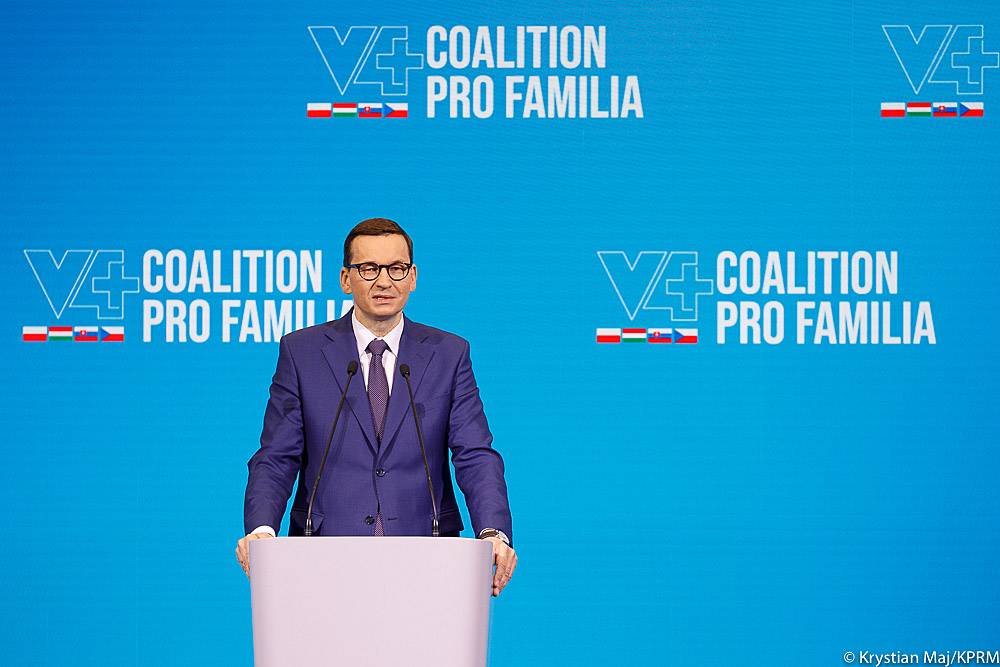The four Central European countries that make up the Visegrad Group – Poland, Hungary, Slovakia and the Czech Republic – today launched a “pro-family coalition” at an event in Warsaw. They aim to promote family policies at the local, national and EU level.
Hosted by Polish prime minister Mateusz Morawiecki and attended by the ministers responsible for family policy in each of the four countries, the event comes ahead of the International Day of Families, which was proclaimed by the UN General Assembly in 1993 and is observed on 15 May.
“For us, family is the foundation,” said Morawiecki, who heads Poland’s national-conservative government. “Society without families would be like civilisation without culture or mathematics without numbers.”
📸 Fotorelacja – 🇵🇱🇭🇺🇸🇰🇨🇿 Międzynarodowa Konferencja #V4 #CoalitionProFamilia. pic.twitter.com/14SWa9AgUU
— Ministerstwo Rodziny i Polityki Społecznej (@MRiPS_GOV_PL) May 13, 2021
“The family is also promotion of values,” continued the prime minister. “In families, the fundamental mechanism of empathy and desire for love are born…Family is, alongside the state, the greatest creation of humanity.”
Therefore “promoting the lives of families, support for families with many children, is an extremely important activity for every state”, he added. But “we [also] want to promote the family within the framework of the European Union; this is for us one of the fundamental aims of social policy in the EU”.
This is why, said the prime minister, he had raised the issue at a European Council summit last week that saw the EU member states release a joint declaration on advancing social cohesion.
Poland and Hungary have repeatedly sought the exclusion of the word "gender" from EU documents, and the Polish government recently said that it would not include the option of a third gender in new harmonised EU identity cards https://t.co/wXb6gr7kxE
— Notes from Poland 🇵🇱 (@notesfrompoland) May 8, 2021
As well as “pro-family policy”, the other two main themes of the event were “the fight against unfavourable demographic trends” and “policies for seniors”.
The Central and Eastern European region has some of the world’s most pessimistic demographic forecasts, with low birth rates and mass emigration resulting in declining populations.
During his speech, Morawiecki hailed his government’s flagship “500+” child benefit policy, which gives monthly payments to parents for each of their children. However, while the popular policy has helped reduce poverty, the number of births has not increased – and in fact recently fell to its lowest level since World War Two.
Jeśli wstępne dane MinCyfryzacji z bazy PESEL się potwierdzą to styczeń będzie wyglądał tak 👇👇👇
Urodzenia za ostatnie 12 miesięcy poniżej 350 tys.
Najmniej od II WŚ ⚠️Zgonów niemal PÓŁ MILIONA ⚠️
Najwięcej od II WŚDeficyt demograficzny na poziomie 140 tys.
Dramat! ⚠️😞 https://t.co/KBCrSehjAP pic.twitter.com/R6PmjZAFPi— Rafał Mundry (@RafalMundry) February 25, 2021
Poland’s minister for family and social policy, Marlena Maląg, called for the creation of a “wide coalition to support families” that would secure “large financial” support from national governments but involve activity by local authorities and NGOs, which “are closest to residents and know their needs”.
During the event, the finalists and winners of a “local government Pro Familia 2021” competition were announced. Its aim is to reward “the most creative and effective pro-family activities” carried out by local authorities and to encourage others to do the same, says the Polish government.
Such policies should “build happy families, because the happiness of the family is in fact the happiness of the whole country”, explained Maląg.
Last year, the minister launched a programme encouraging young people to start families earlier. Data show that Poles are marrying later – or increasingly not at all – and delaying having children.
The prime minister also noted that a major new government programme for post-pandemic recovery, which is due to be launched this Saturday, will include a number of policies aimed at “strengthening the role of family in social life even more”.
The families ministers of the four countries signed a joint declaration that “outlines the directions of our cooperation to conduct research in the field of family support and family needs, in parallel in our four countries”, said Maląg.
💬 Wiele inspiracji i świetnych pomysłów można znaleźć w grupie takiej jak Polska, która zainspirowała nas do wprowadzenia zwolnienia młodych dorosłych z podatku dochodowego od osób fizycznych – 🇭🇺 @KatalinNovakMP Minister ds. Rodzin Węgier.
🇵🇱🇭🇺🇸🇰🇨🇿 #V4 #CoalitionProFamilia pic.twitter.com/XQEXgHJegP
— Ministerstwo Rodziny i Polityki Społecznej (@MRiPS_GOV_PL) May 12, 2021
Main image credit: Krystian Maj/KPRM (under CC BY-NC-ND 2.0)

Daniel Tilles is editor-in-chief of Notes from Poland. He has written on Polish affairs for a wide range of publications, including Foreign Policy, POLITICO Europe, EUobserver and Dziennik Gazeta Prawna.




















